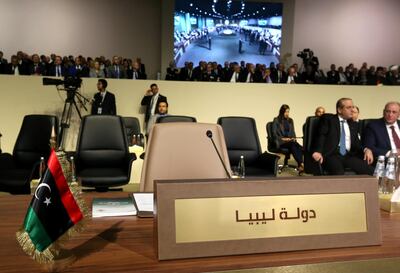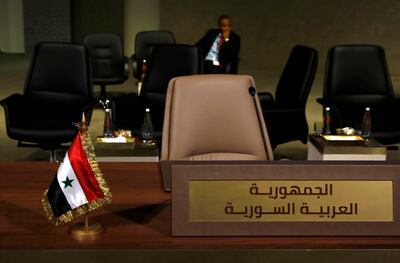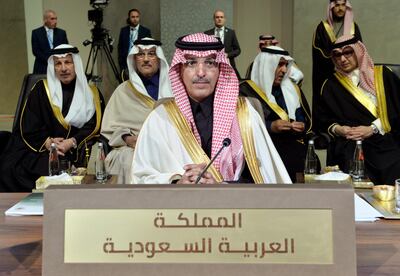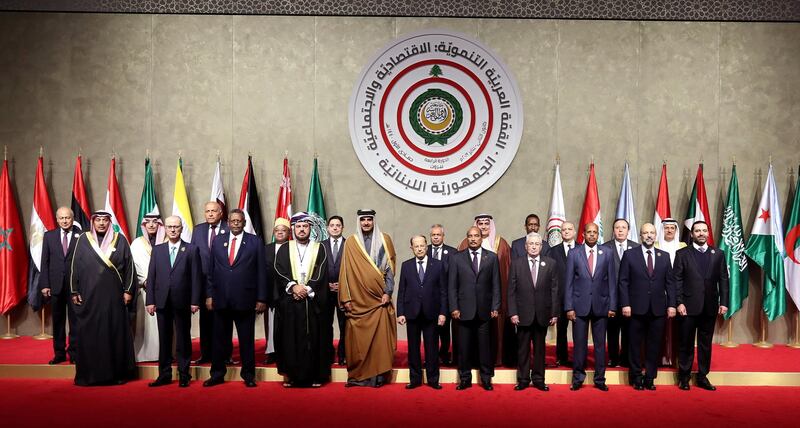Lebanese President Michel Aoun called for the establishment of an Arab development bank for war-ravaged countries during his opening speech at an Arab economic and development summit in Beirut.
Also speaking at the conference, Kuwait's Foreign Minister Sheikh Sabah Al Khalid Al Sabah, said his country is launching an initiative to create a $200 million fund for investments in technology and would give $50 million to the fund which the private sector will take part in.
The Lebanese president called for the establishment of an "Arab reconstruction and development bank" that will assist "all affected Arab states and people" in overcoming their struggles and achieving long-term economic growth.
__________
Read More:
[ Syria’s shadow hovers over Arab League summit in Lebanon ]
Assad’s allies in Lebanon are pushing for Syria's return to the Arab League
Analysis: Return of UAE mission to Damascus suggests Gulf states want a say in Syria's future
Musa Sadr and the 40-year disappearance that landed Gaddafi’s son in prison
_________
He called on pre-existing Arab development banks to convene in Beirut within the next three months to discuss the proposal and other measures to address the need for reconstruction and economic assistance in light of current conditions.
He said that Lebanon had paid a hefty cost as a result of conflicts in the region, adding that his country hosts the highest number of refugees per capita in the world. "Their numbers are equivalent to nearly half of Lebanon's population," he said, noting that Lebanon is a small country, with unsuitable infrastructure, limited resources and an overcrowded job market.
The Arab Economic and Social Development Summit was formed in 2009 as an exclusively economic and development conference that tends to involve the private sector, including banks, chambers of commerce, industry and agriculture.
Sunday's session was attended by only two heads of Arab states. Qatari Emir Sheikh Tamim Bin Hamad Al Thani and Mauritanian President Mohamed Ould Abdel Aziz were the only two to attend, after a series of obstacles mired the conference in controversy only days before delegates arrived.
"We had hoped that this summit would be an occasion that would unite all Arabs and that there would be no empty seats," he told delegates. "We tried our best to resolve the reasons that led to this absence, but unfortunately the obstacles were stronger [than our efforts]."
Mr Aoun did not detail the obstacles but there were two empty seats in the conference hall: Libya, which boycotted the event and Syria, which did not receive an invite.
Libya announced last week that it would boycott the summit after supporters of a Lebanese political party burnt the Libyan flag outside the summit venue. The Amal Movement had said that Libya should not be invited, and its supporters threatened to cut off Beirut's airport road to prevent the Libyan delegation from reaching the summit venue.

At the heart of tensions between the Amal Movement and the Libyan state is the case of party founder and cleric Musa Al Sadr who went missing in 1978 on a trip to Libya at the invite of then-leader Muammar Qaddafi. The Amal Movement has maintained that the Libyan state has been unco-operative with attempts to uncover the fate of the revered cleric. Qaddafi's son, Hannibal, is standing trial in Beirut in connection with the disappearance, despite being a toddler at the time.
Other obstacles hampering the summit included disagreements over whether Syria should be invited to attend, even though it is no longer a member of the Arab league, and if Lebanon should be allowed to host the summit as it is without a government and is on the brink of economic collapse. The last snag was differences over the issue of refugee returns. Lebanese Foreign Minister Gebran Bassil opposed including the word "voluntary" in a summit agenda item related to refugee returns ahead of the conference, angering Arab states, especially those wary of forced repatriation efforts.

Speaking during the summit on Sunday, Saudi Arabia's Finance Minister Mohammed Al Jadaan said that the kingdom will propose incorporating the AESD into the annual Arab League summit, in an apparent jab to Lebanon, which had hoped to use the platform to boost it's sinking economy.
Mr Aoun on Sunday also spoke about the need to repatriate Syrian refugees. He called on the international community to help secure the safe return of the displaced, especially to stable parts of the country, without waiting for a political solution to the conflict. He also said that they should offer incentives for refugees to return and contribute to their country's reconstruction.






